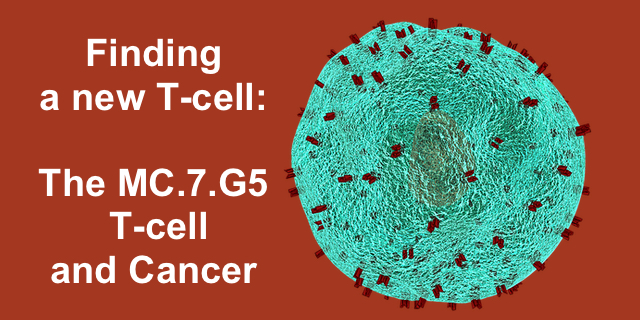Something unusual happened when Professor Andrew Sewell and the T-Cell Modulation Group at the University of Cardiff put the blood of a healthy donor in a petri dish with some cancer cells. What grew in the blood was a T-cell that no one had seen before. This T-cell attacked the cancer cells and destroyed them.
Sewell and his team did what all bench scientists do…they started experiments to see what was happening. And they used a newer strategy to do their experimenting: genome-wide screens using CRISPR.
We discussed CRISPR in a blog post by that name in 2019. It is a way of editing DNA. Here is an explanatory video created by Mayo Clinic.
Using CRISPR allowed Sewell’s group to discover what the new T-cell called MC.7.G5 was targeting on the cancer cells. What they found out was that this new T-cell targeted a common protein on the surface of everyone’s cells called MR1. Here is a video that shows how T-cells target proteins on cell surfaces.
In the lab, the team found that this T-cell killed a wide variety of cancer cells. They tested it against lung, melanoma, leukemia, colon, breast, prostate, bone and ovarian cell lines that had no common protein features (HLAs) other than MR1. They also tested in the lab newer cancer cells from patients with ovarian cancer and melanoma. The MC.7.G5 T-cells took all of these cancers on.
They tested this new T-cell on mice that had leukemia. The mice that got the new T-cells had 3.8%, 7.2% and 0.3% of the leukemia cells in their bone marrows at day 18 compared to the mice that didn’t get the new T-cells. Those control mice had 83%, 78% and 85% of their bone marrow replaced with the leukemia cancer cells at day 18.
Because MR1 protein is found on all cell surfaces, the team tested normal cells and cancer cells to see what would happen. The MC.7.G5 T-cell killed the cancer cells but left the normal cells alone.
This is just the beginning of the research that has to be done but this is a promising development in cancer research. A biotech company in London called Ervaxx is partnering with Dr. Sewell’s group to bring this discovery to patients.
Here is a video on tumor immunology and immunotherapy by Nature.
Reference:
Crowther, M.D., Dolton, G., Legut, M. et al. Genome-wide CRISPR–Cas9 screening reveals ubiquitous T cell cancer targeting via the monomorphic MHC class I-related protein MR1. Nat Immunol 21, 178–185 (2020). https://doi.org/10.1038/s41590-019-0578-8
Image by allinonemovie on Pixabay






Just what I was seeking for; Thank you!
This news made my day, I lost both my parents to cancer and other very dear and close friends to this dreadful disease. I hope the big pharma industry will not interfere with this study!
(Edited): WARNING – see response comment.
Original comment: Taking 5000 IU of D3 (along with 70-100 mg. K2) will make you almost immune to getting many cancers and Covid19 as well! The media want to suppress this information! The other thing is to eliminate white flour and white sugar, which promote tumor growth.
WARNING: We would like to urge that this is not likely correct. 5000 IU of D3 can have negative side effects that outweigh any benefit, furthermore, it is hardly likely to make people immune to cancer or COVID-19. So this is basically false information. We approved the comment to respond with this comment. However, this is not valid scientific data. Furthermore, if you make such claims, please cite sources.